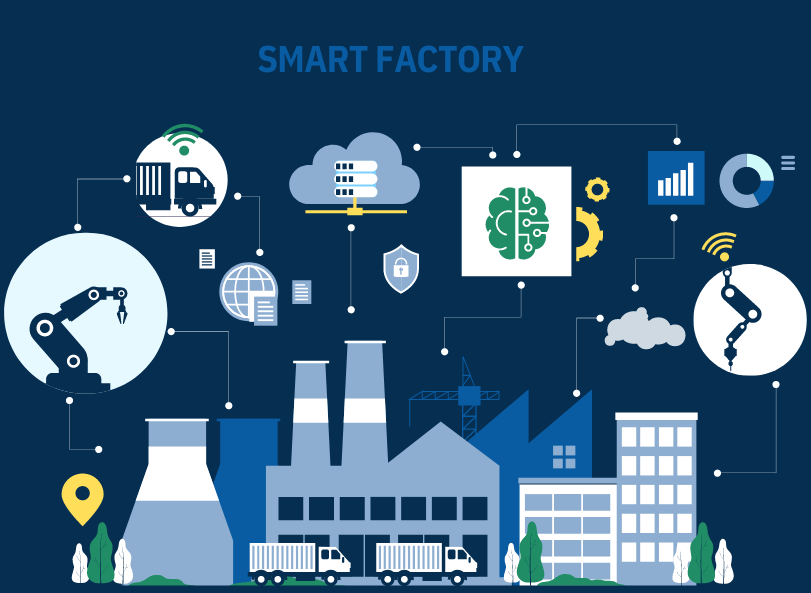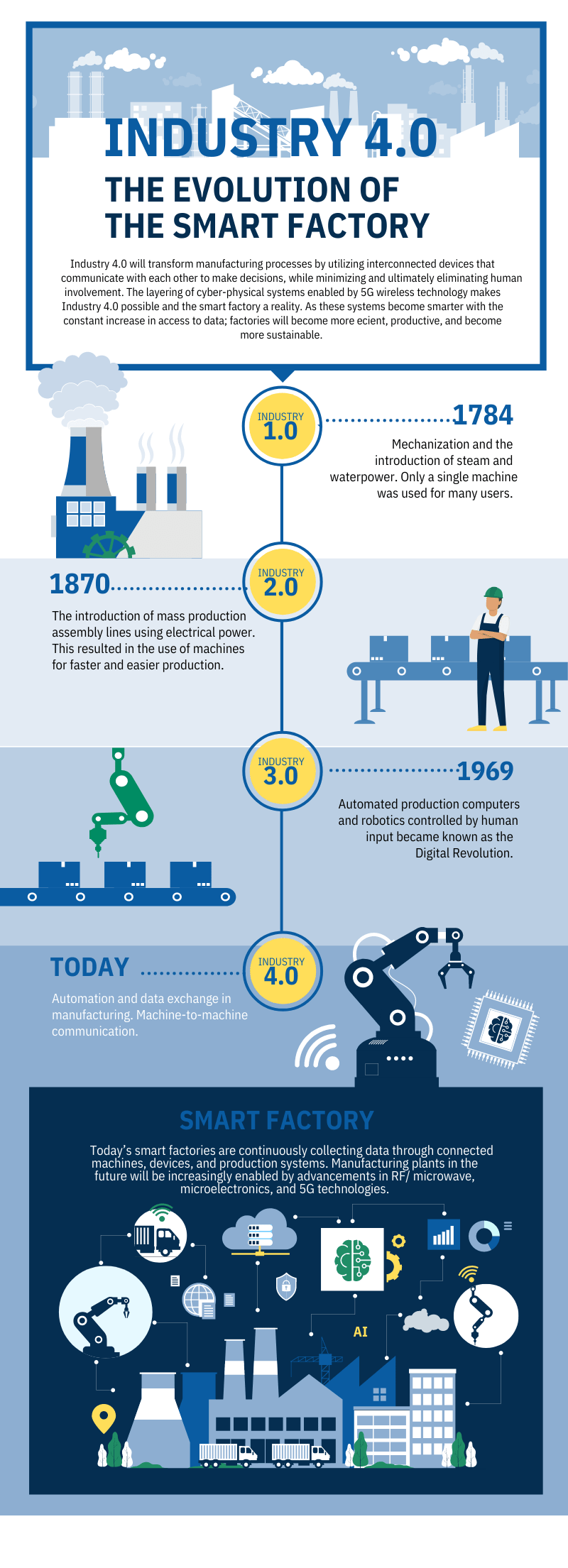INDUSTRY 4.0 - The Evolution of the Smart Factory
Posted by Paul Patterson on 4th Apr 2022


The modern era, starting with the advent of the first factories, is only a few hundred years old. Since then, the evolution to modern manufacturing has been achieved through a series of monumental changes — each of which has had a disruptive impact on our lives.
For much of that time, progress had been relatively slow. Then, everything changed. Advancements in modern transceiver technologies (in all their forms) has revolutionized the way we learn, communicate with each other, and interact with the myriad electronic devices that surround us.
The Importance of Transceivers:
Transceivers are arguably one of the most important devices that will enable the rapid acceleration of Factory 4.0. In the earliest versions, transceivers empowered radio communication. Today, they drive digital communication between people and devices, facilitating the Industrial Internet of Things (IIoT) on the Smart Factory floor.
At Coining, we make high-performance, high-precision components that make technology work.
Industry 4.0 and the Amplification Effect
Since the advent of the transceiver, communication technology has had a disruptive impact on our lives. The previous industrial revolutions were unevenly distributed and took time to have a broad reach. Innovative communications technologies will enable Industry 4.0 to transform the manufacturing landscape with greater velocity, scope, and impact than we’ve ever seen before.
Today, everyone and everything is connected. It is no longer a "nice to have"; it’s a requirement for doing business effectively. This has also changed our expectations of how things should work. We expect technology to do more and constantly stretch the boundaries of what’s possible.
What makes Industry 4.0 so different from previous events?
In the previous industrial revolutions, a change in one area usually caused a single disruption to the overall manufacturing process. Today, the intersection of several new technologies allows for an entirely new set of capabilities at any given time. Each technology alone is important, but together their convergence is essential for rapid ground-breaking solutions to emerge. Breakthroughs such as artificial intelligence (AI), the internet, wireless connections, the app economy, and advanced software technologies that seamlessly connect suppliers, manufacturers, and customers are transforming the way we do business.
What does this mean for business?
A lot is converging here: artificial and superintelligence, big data, the Internet of Things, augmented virtual/mixed reality, the interplay of online and offline, autonomous vehicles, the Gig Economy, and increasingly remote workforces. All these developments require the rapid transmission of increasingly large volumes of data — data that is, in turn, being carried on increasingly faster networks and reaching smaller portable devices.
The quality of the components that go into these devices are critical to ensuring this data gets transmitted effectively and efficiently every time.
Rooted in interconnectivity, automation, artificial intelligence/machine learning, robotics, and real-time data — tomorrow’s smart factories will continuously collect data through connected machines, devices, and production systems. All of which will enable the following improvements:
● Automate difficult, but routine tasks – allowing people to focus their time and attention on high-value tasks.
● Safely do jobs using machines that have historically been considered dangerous for people to do themselves.
● Collect large amounts of data and information that provides better insights and implications on our businesses — consumer data, supply chain data, efficiency data, and performance data, etc.
● Create a faster, more efficient, and more effective production process and shorter time-to-market.
● Increase efficiencies, reduce costs, boost profits, and fuel growth.
Industry 4.0 merges advanced manufacturing techniques with the Internet of Things to create manufacturing systems that are not only interconnected but communicate, analyze, and use the information to drive further intelligent action back into the physical world.
The proliferation of big data – and the responsibility that comes with it
Data is at the core of Industry 4.0. As a result, manufacturers must be mindful of how they collect, store, manage, and protect large amounts of data. Consumer protection will become increasingly important as the burden will continue to shift to companies to protect that data.
Automation will lead to faster production times – and change consumer expectations
Real-time robust data that is collected and distributed along the entire production process allows more “dynamic allocation of resources/capacity, shorter changeover times, and reduced production complexity with fewer constraints” (MarkLogic). This leads to faster output, making way for increased opportunities for customization and on-demand production.
Greater efficiency will lead to lower costs and higher margins
One of the most important advantages of Industry 4.0 is its reduction in cost compared to its predecessors. Although the upfront costs are hefty, the long-term benefits on a company’s bottom-line are significant and sustainable. This is achieved through automated systems, AI, and data management that assist with a business’s profitability. “Helping deliver these cost savings is an improved use of resources, faster manufacturing, less machine/production line downtime, fewer quality issues, less material, and product waste and lower operating costs” (TXM Lean Solutions). The reduction of labor costs alone will fuel significant improvement in profitability.
The drawbacks of Industry 4.0
Due to its complexity, not every company is willing or able to make this daunting jump. According to a McKinsey and Company study (2015), “the majority of companies, especially the small and medium-sized enterprises in the industry, seem rather unwilling to start the digital transformation process.” The hesitation has to do with several barriers faced by manufacturers: ranging from change management and a misunderstanding of technology to the need for high capital investment upfront. For organizations that do venture into the future, there will be an adjustment period that requires a great deal of time, energy, and investment from the people who work for them.
How Coining comes into play
Coining, a world-class AMETEK brand, makes microminiature components that have a significant and immense impact on people's lives. From sensors to satellites, there isn't much happening in the world that doesn't include the products we make.
Today’s interconnected, automated world relies on advanced devices and vast amounts of data streamlined online. We make the components that make all that possible. Coining is the world leader in custom alloys and solder preforms for people who demand precision, flexibility, and speed. We offer specialized bonding wire, precision thermal management materials, and hermetic solutions. With a broad range of products, and the most extensive library of preform dies in the industry, we can move your design to market fast — Industry 4.0 fast.


